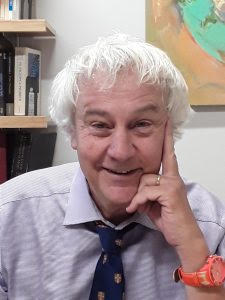 Charles Taliaferro is Professor Emeritus of Philosophy and Emeritus Overby Distinguished Professor at St. Olaf College. We invited him to discuss comparative philosophy of religion as part of our “Philosophers of Religion on Philosophy of Religion” series.
Charles Taliaferro is Professor Emeritus of Philosophy and Emeritus Overby Distinguished Professor at St. Olaf College. We invited him to discuss comparative philosophy of religion as part of our “Philosophers of Religion on Philosophy of Religion” series.
The title of my essay is inspired by Nietzsche’s provocative 1874 essay “The Use and Abuse of History for Life.” However, I confess at the outset, this is a case of flagrant appropriation of a title, putting to one side how to interpret Nietzsche’s own concepts of the use and abuse of inquiry, his concept of what is life-affirming, his critique of history, religion, philosophy, truth, and so on. To compensate fans of Nietzsche for my appropriating his (to me, fetching) title, I offer a guide to engaging Nietzsche’s work.1 So, bracketing whatever Nietzsche’s Übermensch might find life-affirming (if anything) about comparative philosophy of religion, I offer two cases of comparative philosophy of religion that I find life-affirming (useful “for life”) insofar as they can increase the appreciation of different religious identities and reduce religious conflict.
The two cases of comparative philosophy of religion commended in this essay involve Christianity and Islam and Christianity and Judaism. I am a Christian philosopher who has engaged in dialogue with Muslim and Jewish philosophers, so I write as a practitioner in, rather than a spectator of, comparative philosophy of religion.2
Christianity and Islam: As most readers know, the parameters of religious traditions can be quite porous. For example, there are self-described Christians who are not theists (and some seem indistinguishable from secular atheists). As a comparatively conservative Christian (being a theist and accepting the Nicene and Chalcedonian creeds), I find the most promising route to some (at least partial) accord with Muslim philosophers lies in dialogue about our shared monotheism. This is well documented in multiple conferences and publications in which philosophers representing the Abrahamic faiths engage in reflection on divine attributes (including divine goodness, omnipotence, omniscience, omnipresence, eternity, aseity or necessity) and creation. To recommend only one exemplary case of comparative philosophy of religion, consider God and Creation, based on An Ecumenical Symposium in Comparative Religious Thought that took place in 1987.3 There have been abundant such conferences focusing on our monotheism since. These exchanges have included fruitful work on the virtues and vices of philosophical methodology, the need to avoid caricaturing the positions of others, the importance of impartiality, the need to cultivate an appreciation of religious traditions from the point of view of practitioners.4
In addition to a shared focus on monotheism, I highlight Christian-Muslim dialogue about points of difference involving claims about Jesus Christ. The significance of Jesus in Islam is substantial; he is referred to 97 times in the Qur’an (Mary is referred to 70 times). The book, The Muslim Jesus: Sayings and Stories in Islamic Literature is a rich resource of the myriad portraits of Jesus in Islamic sacred texts and traditions.5 On exchanges about Jesus Christ, I find that there is a greater opportunity for accord (but not, of course, full agreement) when Christianity is represented in the context of a high Christology. In that vein, Jesus Christ is identified as at one with the second member of the trinity. The incarnation involves the pre-existence of Jesus, prior to (or independent of) the birth of Jesus of Nazarus. On this view, Jesus is fully human and wholly God (Totus Deus) but not the whole of God (Totum Dei). This can enable one to interpret some of the historically divisive scriptural teachings that are closer (or less attenuated) from an Islamic perspective. Consider these tenets: the proclamation that Christ is the Messiah; Jesus Christ is the way, the truth and the light, and that no one comes to the Father except through Christ; and the affirmation of the trinity. Muslims see Jesus as only a prophet, not the Messiah, Jesus is not divine, and there are explicit denials of the trinity in the Qur’an. Even so, the notion that Jesus is the Messiah is compatible with (or can be interpreted as) the notion that God (Allah) worked through Jesus Christ to show the path of redemption. Muslims can (and do) believe that Allah is the way, the truth, and the life and no one comes to Allah except by Allah. This does not (explicitly) rule out that Allah might act through Jesus, the prophet, to show us the way to Allah. While Muslims must deny what is called the social model of the trinity (the Godhead consists of three persons, Father, Son, Holy Spirit), they can (in principle) be more hospitable to modal accounts of the trinity (as found in Barth and Rahner). On the later, God is revealed in three modes, quite independent of God’s internal constitution.6 There are, of course, vexing contrasts. The Qur’an seems to hold that Jesus was not killed; Keith Ward proposes that the Qur’anic verse may be rendered as the claim that Jesus appeared to be killed (in the sense that he appeared to his enemies to be annihilated), but he instead ascended into the presence of Allah.7 I readily affirm that there are genuine conflicts between traditional Christian and Muslim claims. I only sketch here some paths toward some compatibility. In my experience, such accord has been sufficient to join in a shared prayer on several occasions with Muslim philosophers. For those philosophers of religion who identify religions as forms of life, such shared practices provide some evidence of concord.
Christianity and Judaism. The tension between Judaism and Christianity, going back to the first century is well documented. And at times, “tension” is obviously too weak a term. There is indisputable evidence that historically significant anti-Semitism in Christian tradition has prompted violent, systematic persecution culminating in the murder of six million Jews in the mid-twentieth century.8 How might comparative philosophy of religion address such horror and tragedy? One role by Christian philosophical theologians has been to reject a stagnant understanding of the meaning of revealed, sacred texts and earlier dogmatic claims that regard the divine covenant with the Jews as surpassed and rendered void. Some late 20th century Christian philosophers, including Pope John Paul II (who was trained in phenomenology), repudiate the sinful legacy of anti-Semitism, affirm the Jewish roots of Christianity, and reject supersessionism (Christianity supersedes Judaism) in favor of recognizing the continuous integrity of Judaism as a divine covenantal community. This is an on-going process. The Anglican Bishop and Biblical scholar, N.T. Wright laments interpreting the New Testament “through the misted-up spectacles of post-Holocaust western thinkers.” But this seems to treat the meaning of the New Testament as something fixed in time and not subject to what some Christian philosophers and theologians contend are new insights about God’s nature and goodness.
To some secular philosophers, the above cases may seem mired in superstition and discredited views of revelation. To those readers I propose a thought experiment. Imagine (if only for the sake of pursuing a sense of interreligious dialogue from the standpoint of a practitioner) you believe that the Abrahamic faiths each do offer some elements of an authentic view of God as good and just. If so, isn’t there some reason to think that promoting such constructive moves are a good use of comparative philosophy of religion, whereas undermining them may not be abuse, but less than helpful.
1. Nietzsche’s essay is available online: https://la.utexas.edu/users/hcleaver/330T/350kPEENietzscheAbuseTableAll.pdf
For secondary work, I recommend “Nietzsche’s Theory of Value and the Good Life” in Value and the Good Life by Thomas Carson (Notre Dame: University of Notre Dame Press, 2000, chapter 4, 97-123 and “Friedrich Nietzsche and the Genealogy of Evil” by David Booth in The History of Evil in the Eighteenth and Nineteenth Centuries edited by D. Hedley, C. Meister, C. Taliaferro (London: Routledge, 2018, chapter 16, 236-247.
2. The notion of being a Christian philosopher is not clearly delineated in the philosophy of religion literature. See, for example, Christian Philosophy: Conceptions, Continuations, and Challenges edited by J. Aaron Simmons. In this context, suffice to say I have been in dialogue about the relationship of Christianity, Islam, and Judaism in which I represent Christianity and other philosophers represent Islam and Judaism. See my own and others contributions to Interreligious Dialogue edited by G. Oppy and N.N. Takakis (London: Routledge, 2020). On the relationship of Christianity and Islam, I am indebted to Keith Ward’s Religion in the Modern World (Cambridge: Cambridge University Press, 2019) and on Christianity and Judaism, see “The Cruelty of Supersessianism: The Case of Dietrich Bonhoeffer,” by John Phelan, Religions 13:59, 2022, 1-13.
3. God and Creation edited by David Burrell and Bernard McGinn (Notre Dame: University of Notre Dame Press, 2017).
4. In a philosophical meeting in Tehran with Muslim philosophers in 2013, I presented “Is there a place for Strategic Thinking in Philosophical Refection?” later published with co-author Thomas Churchill in Philosophia Christi 17:1, 2015, 213-221. We contend that there is no place for strategic thinking or arguments where “strategy” involves manipulation, the aim of winning disputes as opposed to seeking the truth.
5. Collected, edited, and translated by Tarif Khalidi, Harvard University Press, 2001.
6. If the social model of the trinity is accepted, then the main, more modest tenet of the modal account follows but not vice versa. After all, if the Godhead consists in three persons, then there are three modes in which God is revealed. See the Stanford Encyclopedia entry “Philosophy and Christian Theology”: https://plato.stanford.edu/entries/christiantheology-philosophy/
7. Religion in the Modern World, 151.
8. See the US Holocaust Museum’s summary of the history here: https://www.ushmm.org/research/about-the-mandel-center/initiatives/ethics-religion-holocaust/articles-and-resources/christian-persecution-of-jews-over-the-centuries/christian-persecution-of-jews-over-the-centuries


